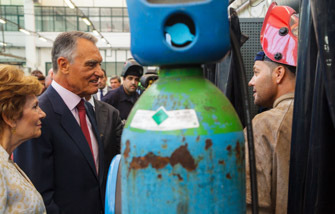
Throughout two days this Conference evoked the memory of José Medeiros Ferreira and his exemplary path in life.
The Long Haul is the name of the book with which his colleagues and students decided to honour him, an eminently fair gesture.
This Conference is equally an eminently fair gesture. For this reason I convey my warmest greetings to the organizing committee, with my best thanks for their invitation and, very specially, to address a word of deep esteem to the kin of José Medeiros Ferreira.
When viewing his life, the long haul of his admirable existence, we find constant features and lines of strength which are coherent with the biography where the public person cohabits with the intellectual, where the academician and the thinker are fully conversant with the militant and interventionist citizen.
Two essential characteristics arise, as I believe, in the heterogeneous personality of José Medeiros Ferreira.
Initially, the love for his country, his republican patriotism, a quality which allowed him to be, simultaneously, a Portuguese Azorean and an Atlantic European.
Secondly, his love for freedom. A free and independent spirit, José Medeiros Ferreira loved ideas and debating them, if this were carried out in a proper and dignified environment. He never took recourse to personal attacks or to verbal violence to vindicate his propositions or his points of view, since these were based upon the power of reason and were the result of serene and quiet reflexion.
José Medeiros Ferreira was noted in early days as a defender of freedom. An activist when a student during the 1962 academic crisis, a driven fighter against the dictatorship, he would become aware of the bitterness of exile. From afar, he continued to view Portugal and its shadows. In those years, he never gave up the fight for the ideal of a democratic country, a European homeland where no one would be persecuted for the foremost belief of José Medeiros Ferreira: the force of thought.
He was a great believer in the April revolution, whether as an adversary of any type of authoritarianism, or as an intellectual that bequeathed us a pioneering historical essay on the carnation revolution.
He acquired his taste for History during his youth, at the desks of Ponta Delgada (Azores) secondary school. It was there that he started to build the solid and wide humanistic culture that would guide him throughout all his life.
His political activity comprised the genetic code of the democratic State – the title of another one of his works – and José Medeiros Ferreira asserted himself as a notable member of the Government of a young democracy, which he served in difficult and very demanding times.
With respect to his qualities as an academician, the vastness of his work and the gratefulness of his many disciples, are the most conclusive proof that José Medeiros Ferreira was a university member who placed his marker on several generations and deserved the unanimous respect of his peers. In and outside the university he provided an unparalleled contribution to contemporary Portuguese historiography and to a reflexion of Portugal’s positioning vis-à-vis the world.
Both as an historian and as an expert in international issues, José Medeiros Ferreira was able to reconcile theory and practice, bringing together his political and governmental experience with impressible enlightened analyses.
José Medeiros Ferreira was always adverse to dogmas and commonplaces. In times so far overcome by the accessory and the frivolous, we heard his words, even if we disagreed with them, as the result of an own and autonomous reflexion, never conditioned by occasional interests or immediately advantageous political objectives. It was this straightforwardness of thought and freedom of spirit that allowed him to write so fully and brilliantly about Portugal, a country in the gravitation of Europe.
He would dedicate one of his last writings to the future of the European Union, to the crossroads that often try to tear it apart. He pondered the project of a united Europe without scepticisms or resentments, but equally without illusions or false hopes. This essay places José Medeiros Ferreira within the very restricted sector of the great European intellectuals.
Medeiros Ferreira asserted himself in public as a realist, who rejected fleeting utopias but would not abdicate from the capacity to dream. He dreamt about a more cohesive and united Europe, both fraternal and friendlier. He dreamt of a free and democratic country, but also of a better informed society. After combating authoritarianism that was his great battle for democracy. He never tired of fighting for a Republic built on the loyal confrontation of ideas and for a more participating and active citizenship.
After a long haul, his life would be discontinued when we still expected so much from him.
Many of his dreams saw the light of day and became materialized. Others are still pending. Those were the dreams of a great man, of a principled individual of great calibre, who forever loved his country.
Portugal has a debt of gratitude with José Medeiros Ferreira.
We should honour his memory today. A happy memory, of independence and freedom.
Thank you very much.
© 2006-2016 Presidency of the Portuguese Republic
You have gained access to the records of the Official Site of the Presidency of the Republic from 9 March 2006 to 9 March 2016.
The contents available here were entered in the site during the 10 year period covering the two mandates of President of the Republic Aníbal Cavaco Silva.